英语中的专有名词_名词 英语语法.doc
(完整版)英语语法专业术语
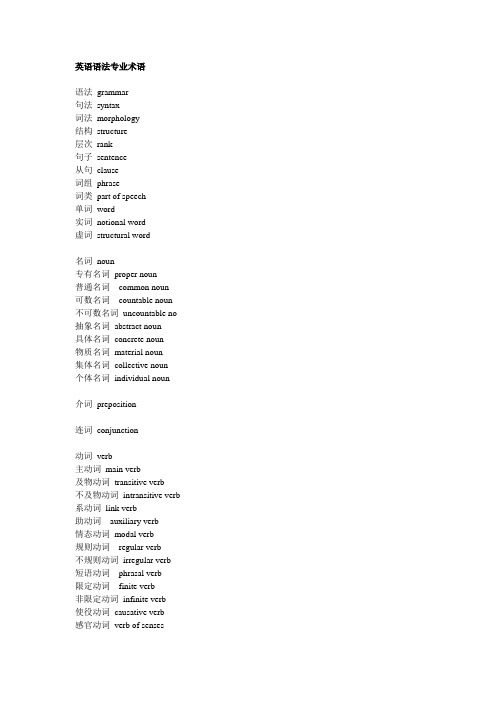
英语语法专业术语语法grammar句法syntax词法morphology结构structure层次rank句子sentence从句clause词组phrase词类part of speech单词word实词notional word虚词structural word名词noun专有名词proper noun普通名词common noun可数名词countable noun 不可数名词uncountable no 抽象名词abstract noun具体名词concrete noun物质名词material noun集体名词collective noun个体名词individual noun介词preposition连词conjunction动词verb主动词main verb及物动词transitive verb不及物动词intransitive verb 系动词link verb助动词auxiliary verb情态动词modal verb规则动词regular verb不规则动词irregular verb 短语动词phrasal verb限定动词finite verb非限定动词infinite verb使役动词causative verb感官动词verb of senses动态动词event verb静态动词state verb感叹词exclamation形容词adjective副词adverb方式副词adverb of manner程度副词adverb of degree时间副词adverb of time地点副词adverb of place修饰性副词adjunct连接性副词conjunct疑问副词interrogative adverb关系副词relative adverb代词pronoun人称代词personal pronoun物主代词possessive pronoun反身代词reflexive pronoun相互代词reciprocal pronoun指示代词demonstrative pronoun疑问代词interrogative pronoun关系代词relative pronoun不定代词indefinite物主代词possessive pronoun名词性物主代词nominal possessive形容词性物主代词adjectival possessive pronoun冠词article定冠词definite article不定冠词indefinite article数词numeral基数词cardinal numeral序数词ordinal numeral分数词fractional numeral形式form单数形式singular form复数形式plural form限定动词finite verb form非限定动词non-finite verb form原形base form从句clause从属句subordinate clause并列句coordinate clause名词从句nominal clause定语从句attributive clause状语从句adverbial clause宾语从句object clause主语从句subject clause同位语从句appositive clause时间状语从句adverbial clause of time地点状语从句adverbial clause of place方式状语从句adverbial clause of manner让步状语从句adverbial clause of concession原因状语从句adverbial clause of cause结果状语从句adverbial clause of result目的状语从句adverbial clause of purpose条件状语从句adverbial clause of condition真实条件状语从句adverbial clause of real condition非真实条件状语从句adverbial clause of unreal condition 含蓄条件句adverbial clause of implied condition错综条件句adverbial clause of mixed condition句子sentence简单句simple sentence并列句compound sentence复合句complex sentence并列复合句compound complex sentence陈述句declarative sentence疑问句interrogative sentence一般疑问句general question特殊疑问句special question选择疑问句alternative question附加疑问句tag question反义疑问句disjunctive question修辞疑问句rhetorical question感叹疑问句exclamatory question存在句existential sentence肯定句positive sentence否定句negative sentence祈使句imperative sentence省略句elliptical sentence感叹句exclamatory sentence基本句型basic sentence pattern句子成分members of sentences 主语subject谓语predicate宾语object双宾语dual object直接宾语direct object间接宾语indirect object复合宾语complex object同源宾语cognate object补语complement主补subject complement宾补object complement表语predicative定语attribute同位语appositive状语adverbial句法关系syntactic relationship 并列coordinate从属subordination修饰modification前置修饰pre-modification后置修饰post-modification限制restriction双重限制double-restriction非限制non-restriction数number单数形式singular form复数形式plural form规则形式regular form不规则形式irregular form格case普通格common case所有格possessive case主格nominative case宾格objective case性gender阳性masculine阴性feminine通性common中性neuter人称person第一人称first person第二人称second person第三人称third person时态tense过去将来时past future tense过去将来进行时past future continuous tense过去将来完成时past future perfect tense一般现在时present simple tense一般过去时past simple tense一般将来时future simple tense现在完成时past perfect tense过去完成时present perfect tense将来完成时future perfect tense现在进行时present continuous tense过去进行时past continuous tense将来进行时future continuous tense过去将来进行时past future continuous tense现在完成进行时present perfect continuous tense 过去完成进行时past perfect continuous tense语态voice主动语态active voice被动语态passive voice语气mood陈述语气indicative mood祈使语气imperative mood虚拟语气subjunctive mood否定negation否定范围scope of negation全部否定full negation局部否定partial negation转移否定shift of negation语序order自然语序natural order倒装语序inversion全部倒装full inversion部分倒装partial inversion直接引语direct speech间接引语indirect speech自由直接引语free direct speech自由间接引语free indirect speech一致agreement主谓一致subject-predicate agreement 语法一致grammatical agreement概念一致notional agreement就近原则principle of proximity强调emphasis重复repetition语音pronunciation语调tone升调rising tone降调falling tone降升调falling-rising tone文体style正式文体formal非正式文体informal口语spoken/oral English套语formulistic expression英国英语British English美国英语American English用法usage感情色彩emotional coloring褒义commendatory贬义derogatory幽默humorous讽刺sarcastic挖苦ironic动名词gerund连字号hyphen祈使语气imperative mood祈使句imperative sentences独立成分indefinite case主句indicative mood物质名词material nouns句子的成分members of the sentence 情态动词modal verbs语气mood词法morphology否定疑问句negative interrogative sentence动词的非限定形式non-finite forms of the verb非限制性定语从句non-restrictive attributive clauses 括号brackets名词的分类classification of nouns从句(分句)clauses同源宾语cognate object集体名词collective nouns冒号colon逗号comma普通格common case普通名词common nouns比较级comparative degree复合宾语complex Object复合句complex sentences并列复合句compound complex sentences表性状的复合谓语compound nominal predicate复合谓语compound predicate并列句compound sentences表行为的复合谓语compound verbal predicate合成词compound words合成compounding ( composition )错综时间条件句conditional sentences of mixed time 连词conjunction连接副词conjunctive adverbs连接代词conjunctive pronouns转化conversion并列连词co-coordinating conjunctions可数名词countable nouns破折号dash陈述句declarative sentences定冠词definite article比较的级别degrees of comparison指示代词demonstrative pronouns派生(词缀法)derivation ( affixation )描绘性定语descriptive attributes呼语direct address直接宾语direct object直接引语direct speech反意问句disjunctive questions省略ellipsis省略句elliptical sentences感叹号exclamation mark感叹句exclamatory sentences动词的限定形式finite forms of the verb虚词form words分数词fractional numerals完全倒装full inversion将来进行时future continuous一般将来时future indefinite将来完成时future perfect将来完成进行时future perfect continuous独立结构absolute constructions物主代词的绝对形式absolute forms of possessive pronouns 抽象名词abstract nouns主动语态active voice方式状语从句adverbial clauses of manner地点状语从句adverbial clauses of place目的状语从句adverbial clauses of purpose时间状语从句adverbial clauses of time程度副词adverbs of degree频度副词adverbs of frequency方式副词adverbs of manner地点副词adverbs of place时间副词adverbs of time选择问句alternative questions句子分析analysis of sentences省略号apostrophe同谓语appositive同位语从句appositive clauses助动词auxiliary verbs插入语parenthesis部分倒装partial inversion分词短语participial phrases分词participle小品词particle词类parts of speech过去式past forms过去分词past participle句号period ( full stop )人称person人称代词personal pronouns成语动词phrasal verbs谓语predicate表语predicative表语从句predicative clauses前缀prefix(es)介词短语prepositional phrases现在式present forms现在分词present participle动词的主要形式principal forms of verbs专有名词proper nouns标点符号punctuation问号question mark引号quotation mark相互代词reciprocal pronouns不定代词indefinite Pronouns关系副词relative adverbs关系代词relative pronouns限制性定语从句restrictive attributive clauses 自身代词self pronouns分号semicolon真实条件句sentences of real condition虚拟条件句sentences of unreal condition时态的呼应sequence of tenses特殊问句special questions虚拟语气subjunctive mood后缀suffix(es)最高级superlative degree句法syntax句型的转换transformation of sentences双部句two-member sentences不可数名词uncountable nouns动词短语verbal phrases名词化的动词verbal noun构词法word building。
英语语法专有名词中英对应名称

英语语法专有名词中英对应名称语法grammar 句法syntax 词法morphology结构structure 层次rank 句子sentence从句clause 词组phrase 词类part of speech单词word 实词notional word 虚词structural word名词noun 专有名词proper noun 普通名词common noun可数名词countable noun 不可数名词uncountable noun 抽象名词abstract noun具体名词concrete noun 物质名词material noun 集体名词collective noun个体名词individual noun 介词preposition 连词conjunction不及物动词intransitive verb 系动词link verb 助动词auxiliary verb情态动词modal verb 规则动词regular verb 不规则动词irregular verb短语动词phrasal verb 限定动词finite verb 非限定动词infinite verb使役动词causative verb 感官动词verb of senses 动态动词event verb 形容词adjective副词adverb 方式副词adverb of manner 程度副词adverb of degree时间副词adverb of time 地点副词adverb of place 修饰性副词adjunct连接性副词conjunct 疑问副词interrogative adverb 关系副词relative adverb代词pronoun 人称代词personal pronoun 物主代词possessive pronoun反身代词reflexive pronoun 相互代词reciprocal pronoun 指示代词demonstrative pronoun 疑问代词interrogative pronoun 关系代词relative pronoun 不定代词indefinite pronoun物主代词possessive pronoun 名词性物主代词nominal possessive pronoun形容词性物主代词adjectival possessive pronoun 冠词article定冠词definite article 不定冠词indefinite article 数词numeral基数词cardinal numeral 序数词ordinal numeral 分数词fractional numeral形式form 单数形式singular form 复数形式plural form限定动词finite verb form 非限定动词non-finite verb form \原形base form从句clause 从属句subordinate clause 并列句coordinate clause名词从句nominal clause 定语从句attributive clause 状语从句adverbial clause宾语从句object clause 主语从句subject clause 同位语从句appositive clause时间状语从句adverbial clause of time 地点状语从句adverbial clause of place方式状语从句adverbial clause of manner 让步状语从句adverbial clause of concession原因状语从句adverbial clause of cause 结果状语从句adverbial clause of result目的状语从句adverbial clause of purpose 条件状语从句adverbial clause of condition真实条件状语从句adverbial clause of real condition非真实条件状语从句adverbial clause of unreal condition含蓄条件句adverbial clause of implied condition错综条件句adverbial clause of mixed condition句子sentence 简单句simple sentence 并列句compound sentence复合句complex sentence 并列复合句compound complex sentence陈述句declarative sentence 疑问句interrogative sentence 一般疑问句general question 特殊疑问句special question 选择疑问句alternative question基本句型basic sentence pattern 句子成分members of sentences主语subject 谓语predicate 宾语object 双宾语dual object 直接宾语direct object 间接宾语indirect object复合宾语complex object 同源宾语cognate object补语complement 主补subject complement宾补object complement 表语predicative定语attribute 同位语appositive状语adverbial 句法关系syntactic relationship并列coordinate 从属subordination修饰modification 前置修饰pre-modification后置修饰post-modification 限制restriction双重限制double-restriction 非限制non-restriction数number 单数形式singular form复数形式plural form 规则形式regular form不规则形式irregular form普通格common case 所有格possessive case主格nominative case 宾格objective case性gender第一人称first person 第二人称second person第三人称third person 时态tense过去将来时past future tense 过去将来进行时past future continuous tense过去将来完成时past future perfect tense一般现在时present simple tense 一般过去时past simple tense一般将来时future simple tense 现在完成时past perfect tense过去完成时present perfect tense 将来完成时future perfect tense现在进行时present continuous tense 过去进行时past continuous tense将来进行时future continuous tense 过去将来进行时past future continuous tense 现在完成进行时present perfect continuous tense过去完成进行时past perfect continuous tense主动语态active voice被动语态passive voice 陈述语气indicative mood 祈使语气imperative mood虚拟语气subjunctive mood 否定negation否定范围scope of negation 全部否定full negation局部否定partial negation 转移否定shift of negation语序order 自然语序natural order倒装语序inversion 全部倒装full inversion部分倒装partial inversion 直接引语direct speech间接引语indirect speech 自由直接引语free direct speech 自由间接引语free indirect speech 一致agreement主谓一致subject-predicate agreement 语法一致grammatical agreement 概念一致notional agreement 就近原则principle of proximity。
高中英语语法名词
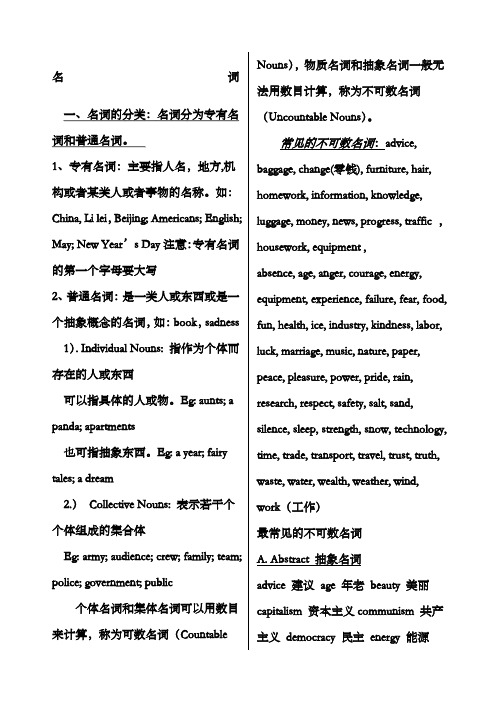
名词一、名词的分类:名词分为专有名词和普通名词。
1、专有名词:主要指人名,地方,机构或者某类人或者事物的名称。
如:China, Li lei,Beijing; Americans; English; May; New Year’s Day注意:专有名词的第一个字母要大写2、普通名词:是一类人或东西或是一个抽象概念的名词,如:book,sadness 1). Individual Nouns: 指作为个体而存在的人或东西可以指具体的人或物。
Eg: aunts; a panda; apartments也可指抽象东西。
Eg: a year; fairy tales; a dream2.)Collective Nouns: 表示若干个个体组成的集合体Eg: army; audience; crew; family; team; police; government; public个体名词和集体名词可以用数目来计算,称为可数名词(Countable Nouns),物质名词和抽象名词一般无法用数目计算,称为不可数名词(Uncountable Nouns)。
常见的不可数名词:advice, baggage, change(零钱), furniture, hair, homework, information, knowledge, luggage, money, news, progress, traffic ,housework, equipment ,absence, age, anger, courage, energy, equipment, experience, failure, fear, food, fun, health, ice, industry, kindness, labor, luck, marriage, music, nature, paper, peace, pleasure, power, pride, rain, research, respect, safety, salt, sand, silence, sleep, strength, snow, technology, time, trade, transport, travel, trust, truth, waste, water, wealth, weather, wind, work(工作)最常见的不可数名词A. Abstract 抽象名词advice 建议age 年老beauty 美丽capitalism 资本主义communism 共产主义democracy 民主energy 能源fun 乐趣happiness 幸福help 帮助honesty 诚实information 信息justice 正义kindness 善knowledge 知识laughter 笑声liberty 自由life 生命、生物、活力play 玩recreation 娱乐strength 实力trouble 麻烦truth 真理virtue 美德wisdom 智慧work 工作youth 青年B. Matter, material 物质名词air 空气beer 啤酒blood 血液bread 面包butter 黄油cake 蛋糕chalk 粉笔cheese 奶酪coal 煤coffee 咖啡electricity 电力fog 雾fish 鱼gold 黄金grass 草hair 头发ice 冰ink 油墨iron 铁juice 果汁lumber 木材meat 肉milk 牛奶oil 油oxygen 氧气paper 纸rain 雨rice 水稻smoke 烟雾snow 雪soap 肥皂soup 汤sugar 糖tea 茶water 水wine 葡萄酒wood 木C. Generic terms 属类business 商业change 零钱equipment 设备fruit 水果furniture 家具jewelry 珠宝luggage 行李machinery 机械mail 邮件money 金钱news 新闻propaganda 宣传scenery 风景slang 俚语stationery 文具traffic 交通vegetation 植被weather 天气D. Subject matter 学科architecture 建筑art 艺术chemistry 化学civics 市政学economics 经济学engineering 工程English 英语geology 地质学grammar 语法history 历史literature 文学mathematics 数学music 音乐philosophy 哲学physics 物理学science 科学technology 技术vocabulary 词汇E. Sports and recreation 运动和休闲baseball 棒球basketball 篮球bridge 桥牌camping 露营dancing 跳舞drinking 饮酒football 足球golf 高尔夫hiking 远足hockey 曲棍球homework 家庭作业hunting 狩猎opera 歌剧sailing 帆船singing歌唱softball 垒球swimming 游泳television 电视traveling 旅行volleyball 排球F. Countable and non-countable nouns 一词多意要具体对待age 年老/年龄baseball (and other balls) 棒球(运动)/(一个)棒球(和其他球)beer (and other drinks) 啤酒(物质)/(一杯)啤酒(和其他饮料)business 商业/公司change 找零/变改company 陪伴/公司dope 毒品/傻瓜glass 玻璃/玻璃杯、眼镜iron 铁/熨斗paper 纸/文件play 玩耍/戏剧room 空间/房间smoke 烟雾/香烟tape 胶带(材料)/胶带物体)tea 茶叶/下午茶work 工作/着作youth 青春/青年人3). Material Nouns: 指无法分为个体的物质。
英语语法:名词的分类
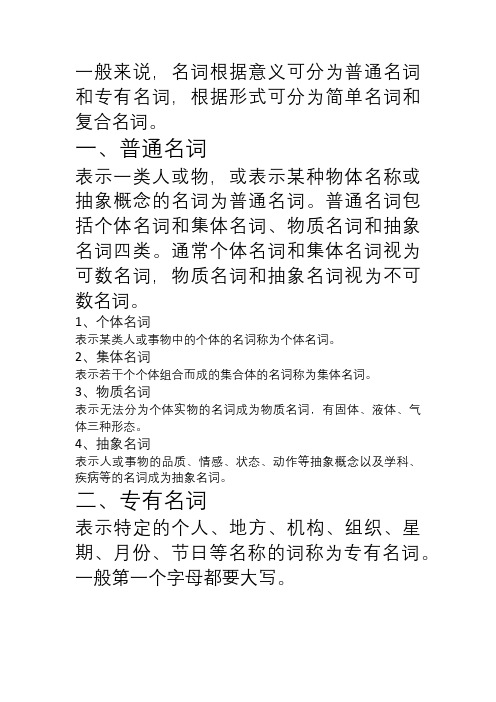
一般来说,名词根据意义可分为普通名词和专有名词,根据形式可分为简单名词和复合名词。
一、普通名词
表示一类人或物,或表示某种物体名称或抽象概念的名词为普通名词。
普通名词包括个体名词和集体名词、物质名词和抽象名词四类。
通常个体名词和集体名词视为可数名词,物质名词和抽象名词视为不可数名词。
1、个体名词
表示某类人或事物中的个体的名词称为个体名词。
2、集体名词
表示若干个个体组合而成的集合体的名词称为集体名词。
3、物质名词
表示无法分为个体实物的名词成为物质名词,有固体、液体、气
体三种形态。
4、抽象名词
表示人或事物的品质、情感、状态、动作等抽象概念以及学科、
疾病等的名词成为抽象名词。
二、专有名词
表示特定的个人、地方、机构、组织、星期、月份、节日等名称的词称为专有名词。
一般第一个字母都要大写。
专有名词中每一个单词的第一个字母一般都要大写,其中冠词和部分较短的介词可以不大写,也可以将所有的字母动要大写。
三、复合名词。
单个名词称为简单名词,而由单个名词加一个或一个以上的名词或其他词类组成的词称为复合名词。
英语语法名词用法(DOC)
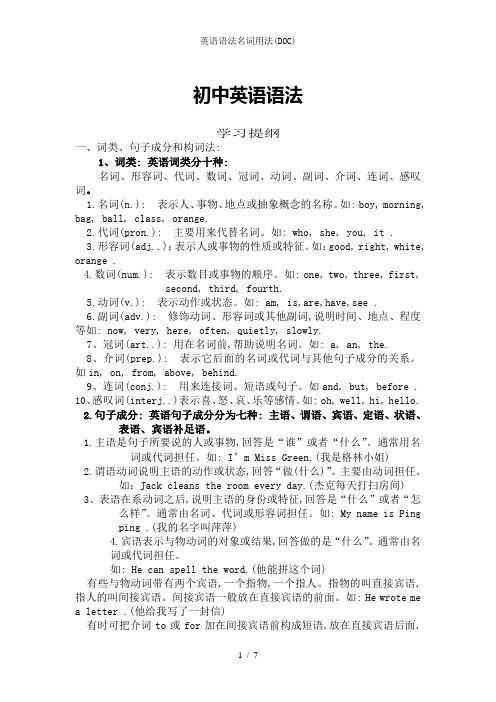
初中英语语法学习提纲一、词类、句子成分和构词法:1、词类: 英语词类分十种:名词、形容词、代词、数词、冠词、动词、副词、介词、连词、感叹词。
1.名词(n.): 表示人、事物、地点或抽象概念的名称。
如: boy, morning, bag, ball, class, orange.2.代词(pron.): 主要用来代替名词。
如: who, she, you, it .3.形容词(adj..):表示人或事物的性质或特征。
如:good, right, white, orange .4.数词(num.): 表示数目或事物的顺序。
如: one, two, three, first,second, third, fourth.5.动词(v.): 表示动作或状态。
如: am, is,are,have,see .6.副词(adv.): 修饰动词、形容词或其他副词,说明时间、地点、程度等如: now, very, here, often, quietly, slowly.7、冠词(art..): 用在名词前,帮助说明名词。
如: a, an, the.8、介词(prep.): 表示它后面的名词或代词与其他句子成分的关系。
如in, on, from, above, behind.9、连词(conj.): 用来连接词、短语或句子。
如and, but, before .10、感叹词(interj..)表示喜、怒、哀、乐等感情。
如: oh, well, hi, hello.2.句子成分: 英语句子成分分为七种: 主语、谓语、宾语、定语、状语、表语、宾语补足语。
1.主语是句子所要说的人或事物,回答是“谁”或者“什么”。
通常用名词或代词担任。
如: I’m Miss Green.(我是格林小姐)2.谓语动词说明主语的动作或状态,回答“做(什么)”。
主要由动词担任。
如:Jack cleans the room every day.(杰克每天打扫房间)3、表语在系动词之后,说明主语的身份或特征,回答是“什么”或者“怎么样”。
英语语法专业术语

英语语法专业术语语法grammar句法syntax词法morphology结构structure层次rank句子sentence从句clause词组phrase词类part of speech单词word实词notional word虚词structural word名词noun专有名词proper noun普通名词common noun可数名词countable noun 不可数名词uncountable no 抽象名词abstract noun具体名词concrete noun物质名词material noun集体名词collective noun个体名词individual noun介词preposition连词conjunction动词verb主动词main verb及物动词transitive verb不及物动词intransitive verb 系动词link verb助动词auxiliary verb情态动词modal verb规则动词regular verb不规则动词irregular verb 短语动词phrasal verb限定动词finite verb非限定动词infinite verb使役动词causative verb感官动词verb of senses动态动词event verb静态动词state verb感叹词exclamation形容词adjective副词adverb方式副词adverb of manner程度副词adverb of degree时间副词adverb of time地点副词adverb of place修饰性副词adjunct连接性副词conjunct疑问副词interrogative adverb关系副词relative adverb代词pronoun人称代词personal pronoun物主代词possessive pronoun反身代词reflexive pronoun相互代词reciprocal pronoun指示代词demonstrative pronoun疑问代词interrogative pronoun关系代词relative pronoun不定代词indefinite物主代词possessive pronoun名词性物主代词nominal possessive形容词性物主代词adjectival possessive pronoun冠词article定冠词definite article不定冠词indefinite article数词numeral基数词cardinal numeral序数词ordinal numeral分数词fractional numeral形式form单数形式singular form复数形式plural form限定动词finite verb form非限定动词non-finite verb form原形base form从句clause从属句subordinate clause并列句coordinate clause名词从句nominal clause定语从句attributive clause状语从句adverbial clause宾语从句object clause主语从句subject clause同位语从句appositive clause时间状语从句adverbial clause of time地点状语从句adverbial clause of place方式状语从句adverbial clause of manner让步状语从句adverbial clause of concession原因状语从句adverbial clause of cause结果状语从句adverbial clause of result目的状语从句adverbial clause of purpose条件状语从句adverbial clause of condition真实条件状语从句adverbial clause of real condition非真实条件状语从句adverbial clause of unreal condition 含蓄条件句adverbial clause of implied condition错综条件句adverbial clause of mixed condition句子sentence简单句simple sentence并列句compound sentence复合句complex sentence并列复合句compound complex sentence陈述句declarative sentence疑问句interrogative sentence一般疑问句general question特殊疑问句special question选择疑问句alternative question附加疑问句tag question反义疑问句disjunctive question修辞疑问句rhetorical question感叹疑问句exclamatory question存在句existential sentence肯定句positive sentence否定句negative sentence祈使句imperative sentence省略句elliptical sentence感叹句exclamatory sentence基本句型basic sentence pattern句子成分members of sentences 主语subject谓语predicate宾语object双宾语dual object直接宾语direct object间接宾语indirect object复合宾语complex object同源宾语cognate object补语complement主补subject complement宾补object complement表语predicative定语attribute同位语appositive状语adverbial句法关系syntactic relationship 并列coordinate从属subordination修饰modification前置修饰pre-modification后置修饰post-modification限制restriction双重限制double-restriction非限制non-restriction数number单数形式singular form复数形式plural form规则形式regular form不规则形式irregular form格case普通格common case所有格possessive case主格nominative case宾格objective case性gender阳性masculine阴性feminine通性common中性neuter人称person第一人称first person第二人称second person第三人称third person时态tense过去将来时past future tense过去将来进行时past future continuous tense过去将来完成时past future perfect tense一般现在时present simple tense一般过去时past simple tense一般将来时future simple tense现在完成时past perfect tense过去完成时present perfect tense将来完成时future perfect tense现在进行时present continuous tense过去进行时past continuous tense将来进行时future continuous tense过去将来进行时past future continuous tense现在完成进行时present perfect continuous tense 过去完成进行时past perfect continuous tense语态voice主动语态active voice被动语态passive voice语气mood陈述语气indicative mood祈使语气imperative mood虚拟语气subjunctive mood否定negation否定范围scope of negation全部否定full negation局部否定partial negation转移否定shift of negation语序order自然语序natural order倒装语序inversion全部倒装full inversion部分倒装partial inversion直接引语direct speech间接引语indirect speech自由直接引语free direct speech自由间接引语free indirect speech一致agreement主谓一致subject-predicate agreement 语法一致grammatical agreement概念一致notional agreement就近原则principle of proximity强调emphasis重复repetition语音pronunciation语调tone升调rising tone降调falling tone降升调falling-rising tone文体style正式文体formal非正式文体informal口语spoken/oral English套语formulistic expression英国英语British English美国英语American English用法usage感情色彩emotional coloring褒义commendatory贬义derogatory幽默humorous讽刺sarcastic挖苦ironic动名词gerund连字号hyphen祈使语气imperative mood祈使句imperative sentences独立成分indefinite case主句indicative mood物质名词material nouns句子的成分members of the sentence 情态动词modal verbs语气mood词法morphology否定疑问句negative interrogative sentence动词的非限定形式non-finite forms of the verb非限制性定语从句non-restrictive attributive clauses 括号brackets名词的分类classification of nouns从句(分句)clauses同源宾语cognate object集体名词collective nouns冒号colon逗号comma普通格common case普通名词common nouns比较级comparative degree复合宾语complex Object复合句complex sentences并列复合句compound complex sentences表性状的复合谓语compound nominal predicate复合谓语compound predicate并列句compound sentences表行为的复合谓语compound verbal predicate合成词compound words合成compounding ( composition )错综时间条件句conditional sentences of mixed time 连词conjunction连接副词conjunctive adverbs连接代词conjunctive pronouns转化conversion并列连词co-coordinating conjunctions可数名词countable nouns破折号dash陈述句declarative sentences定冠词definite article比较的级别degrees of comparison指示代词demonstrative pronouns派生(词缀法)derivation ( affixation )描绘性定语descriptive attributes呼语direct address直接宾语direct object直接引语direct speech反意问句disjunctive questions省略ellipsis省略句elliptical sentences感叹号exclamation mark感叹句exclamatory sentences动词的限定形式finite forms of the verb虚词form words分数词fractional numerals完全倒装full inversion将来进行时future continuous一般将来时future indefinite将来完成时future perfect将来完成进行时future perfect continuous独立结构absolute constructions物主代词的绝对形式absolute forms of possessive pronouns 抽象名词abstract nouns主动语态active voice方式状语从句adverbial clauses of manner地点状语从句adverbial clauses of place目的状语从句adverbial clauses of purpose时间状语从句adverbial clauses of time程度副词adverbs of degree频度副词adverbs of frequency方式副词adverbs of manner地点副词adverbs of place时间副词adverbs of time选择问句alternative questions句子分析analysis of sentences省略号apostrophe同谓语appositive同位语从句appositive clauses助动词auxiliary verbs插入语parenthesis部分倒装partial inversion分词短语participial phrases分词participle小品词particle词类parts of speech过去式past forms过去分词past participle句号period ( full stop )人称person人称代词personal pronouns成语动词phrasal verbs谓语predicate表语predicative表语从句predicative clauses前缀prefix(es)介词短语prepositional phrases现在式present forms现在分词present participle动词的主要形式principal forms of verbs专有名词proper nouns标点符号punctuation问号question mark引号quotation mark相互代词reciprocal pronouns不定代词indefinite Pronouns关系副词relative adverbs关系代词relative pronouns限制性定语从句restrictive attributive clauses 自身代词self pronouns分号semicolon真实条件句sentences of real condition虚拟条件句sentences of unreal condition时态的呼应sequence of tenses特殊问句special questions虚拟语气subjunctive mood后缀suffix(es)最高级superlative degree句法syntax句型的转换transformation of sentences双部句two-member sentences不可数名词uncountable nouns动词短语verbal phrases名词化的动词verbal noun构词法word building。
英语语法专有名词

• • • • • • • • •
副词 adverb 方式副词 adverb of manner 程度副词 adverb of degree 时间副词 adverb of time 地点副词 adverb of place 修饰性副词 adjunct 连接性副词 conjunct 疑问副词 interogative adverb 关系副词 relative adverb
• • • •
时间状语从句 adverbial clause of time 地点状语从句 adverbial clause of place 方式状语从句 adverbial clause of manner 让步状语从句 adverbial clause of concession • 原因状语从句 adverbial clause of cause • 结果状语从句 adverbial clause of result
• • • • • • • • • • • •
代词 pronoun 人称代词 personal pronoun 物主代词 possesive pronoun 反身代词 reflexive pronoun 相互代词 reciprocal pronoun 指示代词 demonstrative pronoun 疑问代词 interrogative pronoun 关系代词 relative pronoun 不定代词 indefinite pronoun 物主代词 possecive pronoun 名词性物主代词 nominal possesive prnoun 形容词性物主代词 adjectival possesive pronoun
英语语法专有名词
• • • • • • • • • • • •
英语语法-名词

Chinese Japanese sheep fish deer
可数名词的单数变复数(不规则变化)
2.单复数不同形(特殊名词的变化):
1)改变中间元音 foot—feet tooth—teeth goose—geese man—men woman—women mouse-mice 2)词尾加-en或-ren child—children ox—oxen
Homework
1. 复习并背诵名词单数变复数的规则. 2. 写出20个不可数名词(1+1) 3. 写出30个可数名词,并写出其情况 构成方法 读音规则
(1)清辅音/p/,/k/,/t/,/f/等后读/s/ 一般情况 词尾加-s (2)在浊辅/b/,/d/,/g/,/η /,/l/,/m/,/n/等 和元音后读/z/
例词
maps , books , boats verbs , birds , bags , kings , hills , names , pens , cars , trees buses , watches , wishes , boxes radios , kangaroos , heroes , potatoes cities , babies
Good evening!
名 词 (noun)
指人或事物的名称的词.
名词
专有名词:特定的人,地点等.(首字母大写) 例:New York, Yao Ming 普通名词:指一般的人,事物等. 例:apple, pen, doctor 不可数名词 不能以数计算的事物的名词
普通名词
例:液体,气体等。milk, water, air…
3. 以o结尾的名词,一般加~s ,
英语语法名词用法
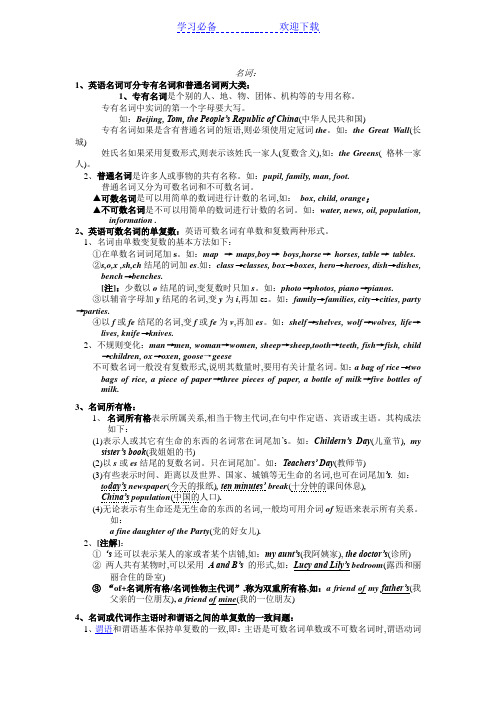
名词:1、英语名词可分专有名词和普通名词两大类:1、专有名词是个别的人、地、物、团体、机构等的专用名称。
专有名词中实词的第一个字母要大写。
如:Beijing, Tom, the People’s Republic of China(中华人民共和国)专有名词如果是含有普通名词的短语,则必须使用定冠词the。
如:the Great Wall(长城)姓氏名如果采用复数形式,则表示该姓氏一家人(复数含义),如:the Greens( 格林一家人)。
2、普通名词是许多人或事物的共有名称。
如:pupil, family, man, foot.普通名词又分为可数名词和不可数名词。
▲可数名词是可以用简单的数词进行计数的名词,如:box, child, orange;▲不可数名词是不可以用简单的数词进行计数的名词。
如:water, news, oil, population, information .2、英语可数名词的单复数:英语可数名词有单数和复数两种形式。
1、名词由单数变复数的基本方法如下:①在单数名词词尾加s。
如:map →maps,boy→boys,horse→horses, table→tables.②s,o,x ,sh,ch结尾的词加es.如:class→classes, box→boxes, hero→heroes, dish→dishes,bench→benches.[注]:少数以o结尾的词,变复数时只加s。
如:photo→photos, piano→pianos.③以辅音字母加y结尾的名词,变y为i,再加es。
如:family→families, city→cities, party →parties.④以f或fe结尾的名词,变f或fe为v,再加es。
如:shelf→shelves, wolf→wolves, life→lives, knife→knives.2、不规则变化:man→men, woman→women, sheep→sheep,tooth→teeth, fish→fish, child→children, ox→oxen, goose→geese不可数名词一般没有复数形式,说明其数量时,要用有关计量名词。
英语语法大全:名词

英语语法大全:名词
1. 名词
名词能够分为专有名词(Proper Nouns)和普通名词 (Common Nouns),专有名词是某个(些)人,地方,机构等专有的名称,如Beijing,China等。
普通名词是一类人或东西或是一个抽象概念的名词,如:book,sadness等。
普通名词又可分为下面四类:
1)个体名词(Individual Nouns):表示某类人或东西中的个体,如:gun。
2)集体名词(Collective Nouns):表示若干个个体组成的集合体,如:family。
3)物质名词(Material Nouns):表示无法分为个体的实物,如:air。
4)抽象名词(Abstract Nouns):表示动作、状态、品质、感情
等抽象概念,如:work。
个体名词和集体名词能够用数目来计算,称为可数名词(Countable Nouns),物质名词和抽象名词一般无法用数目计算,称
为不可数名词(Uncountable Nouns)。
归纳一下,名词的分类能够下
图表示:
_______________________________________
| |专有名词 | |
| 名 | | 个体名词 | |
| | | | 可数名词|
| | | 集体名词 | |
| |普通名词 | | |
| 词 | | 物质名词 | | | | | | 不可数名词| | | | 抽象名词 | |。
英语语法名词

1). 表示时间,如: today`s newspaper今天的报纸, two days` work 两天的工作
2). 表示度量衡及价值 a mile`s distance 一英里的距离,ten dollars` value 10美元的价值
I saw the boy .我看到那个男孩。(boy 作动词saw的宾语) Give the money to your brother. 把这些钱给你兄弟。(brother 作介词to的宾语)
3. 表语 He is a clever boy. 他是个聪明的孩子。
4. 宾语补足语 They called him a fool. 他们叫他傻瓜。
1)一般加-s
如:map------maps地图 field------fields田地
2)以s, x, sh, ch 结尾的名词后加-es
如:class---classes班,box---boxes盒子 dish---dishes盘子, match---matches比赛
如: John`s father 约翰的父亲, spiders` web 蜘蛛网
2. 名词所有格的构成
1)一般直接加" ` ",
如: this child`s book这个小孩的书, children`s books儿童书籍
2)加了-s 或-es 的复数名词后,只加" ` ",
如:work工作,honesty诚实,courage勇气
名词按其可数性分为可数名词(countable nouns)和不可数名词(uncountable nouns)。类名词皆可数,集体名词大都可数,专有名词、物质名词和抽象名词多不可数。
(完整word版)英语语法汇总

英语语法汇总第一章名词一、名词的分类:名词就其词汇意义可分为专有名词和普通名词。
普通名词又可分为可数名词和不可数名词。
专有名词:Beijing Smith the United Nations个体名词:man, expert, factory可数名词集合名词:audience(观众),class, family普通名词:物质名词:water, coal, rice不可数名词抽象名词:surprise, honour, help二、可数名词的复数形式1.一般情况,直接加-s。
port(港口)→ports;technique(技术)—techniques2.以s, x, ch, sh结尾发[s]、[∫]、[t∫]、[dЗ]音的词,加—esbus—buses, box—boxes, bush—bushesbranch—branches,stomach—stomachs(stomach词尾发k,故复数直接加-s)3.辅音字母+ y,变y为i,加-es university—universitiesy前为元音字母,直接加-s boy—boys4.以O结尾加-es hero—heroesO前为元音字母,及部分外来词直接加-szoo—zoos radio—radio piano—pianos photo—photos5.以f或fe结尾,变f或fe为v,再加-es leaf—leaves wife—wives※以下f结尾单词直接加-s belief—beliefs(信念)roof—roofs(屋顶)proof—proofs(证据)safe—safes(保险柜)chief—chiefs(首领)gulf—gulfs(海湾)6.不规则名词man—men, woman—women, foot—feet, tooth—teeth,goose—geese, mouse—mice, child—children, ox—oxen注1:有些可数名词的单复数相同,要根据上下文的意义来确定其单数还是复数,例如:sheep 羊fish 鱼deer 鹿means手段,方法works工厂,作品series系列注2:在些可数名词,只有单数形式,但表示复数意义。
英语语法之名词

一、名词的分类1、专有名词:指某人;某地;某机构等专有的名称;其首字母要大写..如HongKong; China;Bill Clinton;Red Cross2、普通名词:可数名词:个体名词:表示某类人或东西中的个体;如 student;book 集体名词:表示若干个体组成的集合体;如:family;school; group; people不可数名词:物质名词:表示无法分为个体的实物;如:cotton;air;tea抽象名词:表示抽象概念;如 :work;happiness;news二、名词的复数可数名词有单、复数形式;其复数的构成规则如下:1、绝大多数在词尾加s..如:book;books;bag;bags;cup;cups;face;faces.2、以ch;sh;s;x;o结尾的名词加es..如:watch;watches;brush;brushes;hero;heroes;class;classes;下列以o结尾的词加s构成复数:piano ; photo ;radio ;zoo; bamboo ;kilo3、以辅音字母+y结尾的名词;将y改为i;再加es..例如:baby;babies;family;families;以元音字母+y结尾的名词;直接加s..例如:boy;boys;key;keys4、以f或fe结尾的名词;先将f或fe改为v;再加es构成复数形式;如:leaf;leaves; wife;wives.但有些以f结尾的名词;是在f后加s构成复数;常见的有:roof;chief;belief;gulf等..个别的两种方式都可以;如handkerchief’s;handkerchieves5、少数名词的复数形式是不规则的;要一一背记:man→men; woman→women; Englishman→Englishmen;foot→feet;tooth→teeth; child→children; mouse→mice少数名词的单、复数形式相同;如:Chinese;Japanese;sheep;deer; fish; means 注:fishes表不同种类的鱼6、复合名词:A.含man或woman的复合名词;两部分都变为复数形式..如:two men teachers; four women doctorsB.将复合名词中的主体名词变为复数形式;如:lookers-on旁观者;editors-in-chief总编辑; passers-by过路人C.如果没有主体名词;就在词尾后加s..如:grown-ups 成年人;go-betweens 中间人7、以复数形式出现的名词:trousers;glasses眼镜;scales天平;savings储蓄;findings 调查结果; doings行为;surroundings环境;arms武器;fireworks 烟火;remains残余;thanks感谢;riches财富;ashes灰烬 ;stairs 楼梯8、有些名词在一定的词组中要用复数形式..例如:take pains下功夫;made preparations作准备;give regards to 问候三、名词的所有格1、名词的所有格一般用于有生命的名词..其构成多在词尾加上“’s”;如:Tom’s bike;Marx’s works以s结尾的专有名词;在词尾后加“’”或“’s”..如:Engels’/Engels’s works以s结尾的复数名词;只在词尾加“’”..如:students’ homework;a workers’ night school 一所工人夜校;不以s结尾的复数名词;仍在词尾加“’s”..如:men’s clothes男士衣服 children’s books 儿童读物2、如果一个事物为两个人共有;只在后一个名词的词尾加“’s”;如果不是共有;就要在两个名词的词尾分别加上“’s”..例如:Tom and Mike’s room汤姆和迈克合住的房间 Tom’s and Mike’s rooms汤姆、迈克各自的房间3、表示店铺或某人的家时;常在名词所有格后省去shop;house等名词..如:the tailor’s 裁缝店;the barber’s理发店;go to the doctor’s上诊所;at my uncle’s在我叔叔家4、表示时间、距离、国家、城市等无生命的名词;可以在词尾加“’s”或“’”来表示所有格..如:today’s newspaper;half an hour’s rest;twoweeks’ work;ten minutes′walk;China’s population;Shanghai’s industry5、表示无生命的名词一般用of短语表示所有关系..如:the students of their school; the teachers of Grade 26、表示所属物的名词前如果有不定冠词、数词、不定代词;常用“of+所有格”来表示所属关系..例如:He is an old friend of my father’s. This is a picture of Mary’s.△考点分析1.He gained his _______by printing _______of famous writersA.wealth; workB.wealths; worksC.weaths;workD.wealth ;works析:此题答案D..因为wealth 是不可数名词故可排除B、C两个选项;work既可作不可数名词表“工作”意;又可作可数名词表“作品”意;常用复数形式..根据题目意思;此处work应作可数名词用;于是又可排除A..2.Many people agree that_______ knowledge of English is a mustin ______ international trade today.A.a; ×B.the ; anC.the ;theD.×;the析:knowledge 是抽象名词;一般不与不定冠词连用;但指具体“一门学问”或“一门学问的掌握了解”可与不定冠词连用;这可称之为抽象名词具体化..类例如:a strong character 坚强的性格;a bright future光明前途;a waste of time 浪费时间;a pressure on sb.对某人的压力;have a good time玩得痛快;He is a failure /a success as a leader 他当领导不行/很出色..抽象名词不与冠词连用是泛指一般概念、意义..如:what fun fine weather ;common knowledge 常识;Knowledge begins with practice.foreign trade.因此international trade前不用冠词..由以上两点可确定答案为A..3.Oh; John _____you gave usA.How a great surpriseB.How pleasant surpriseC.What a pleasant surpriseD.What pleasant surprise析:正确答案为C..“a/an+形容词+抽象名词”是抽象名词具体化的常见形式..又如:an advanced culture 一种先进文化;a great interest 极大的兴趣;do him a good kindness帮了他一个大忙..4. She broke a _______ while she was washing up .A.glass wineB.wine glassC.wine’s glassD.glass of wine析:根据broke一词及四个选项;可确定空白处应选“酒杯”故可排除A、D;C不是表达“酒杯”的正确形式;只有B才是正确答案..英语中用名词作定语修饰名词的情况很多;这些作定语用的名词可表①分类意义②表时间、地点、称呼③表目的、手段、原料、来源、所属等意义..①例:woman driver ;telephone number ;school education ;research work ;coffee cup ;English teacher ;air pollution②例:book store ;winter sleep ;country life ;college student ;South China③例:milk bottle ;steam boat ;goat skin ;stone wall ;gas station ;lunch room ;tooth brush5.________terrible weather we’ve been having these daysA.WhatB.What aC.HowD.How a析:这是一个感叹句;how修饰形容词;副词或动词;what修饰名词..weather是不可数名词;其前不可加不定冠词a..因此这题正确答案是A..6.Shortly after the accident ;two _______police were sent to the spot to keep order .A.dozens ofB.dozen sC.dozens’ ofD.dozen析:正确答案是 D..dozen; score ;hundred; thousand ;million 等名词前面有数词或many ;several等词;且表示具体数目时;这些名词一般不用复数形式;但在下列短语中却加S;并与of连用:dozens of 许多的;scores of 好几十的;hundreds of 成百的;thousands of 上千的;millions of 数百万的7.I’ll look into the matter a s soon as possible .Just have a little ______.A.waitB.timeC.patienceD.rest析:由题干第一句意“我会尽快调查那件事”;可知下句是要对方不要着急;故答案应为C..这是由情景;语境确定答案题目..8.If by any chance someone comes to see me ;ask them to leavea _________.A.messageB.letterC.sentenceD.notice析:答案为A..道理同第7题..。
英语语法之名词

英语语法之名词1、名词分类⎪⎪⎪⎪⎩⎪⎪⎪⎪⎨⎧⎪⎪⎩⎪⎪⎨⎧⎩⎨⎧⎩⎨⎧raincoat watermelonsnowfall ability courage wealth honey beef wood wool team crew audience suitcase pal Fuji Mt Bible the ,,:,,,,,,,,.,复合名词抽象名词:物质名词:不可数名词集体名词:个体名词:可数名词普通名词专有名词:名词 ◆ 专有名词:表示人名、地名、书名、机构名、日期名、节日或某一事物专有名称的词称为专有名词。
例如:CIA 中央情报局,APEC 亚太经济合作组织,FIFA 国际足球联盟,Lost and Found 失物招领◆ 普通名词:是指一类人、事物、物质或抽象概念的名称。
细分为四类。
① 个体名词:指单个人或单个事物的名词。
例如:kid 孩子,friend 朋友,pencil 铅笔② 集体名词:指一群人或一些事物总称的名词。
例如:crowd 人群,group 组,faculty 全体教师,family 家人,class 一个班级的学生, crew 全体船员, people 人民③ 物质名词:指无法分为个体的物质、材料、食品、饮料、液体、气体、 金属等的名称。
例如:cotton 棉花,wool 羊毛,cloth 布,gold 黄金,rain 雨,gas 气体,solid 固体,liquid 液体④ 抽象名词1)意义:指人或事物的品质、情感、状态、动作等抽象概念及学科、疾病等的名称。
例如:honesty 诚实,love 热爱,improvement 提高,Chinese 语文2)习惯用法A.of +抽象名词:相当于相应的形容词,在句中可作表语、补足语和定语。
例如:a man of sense = a sensible man 一个有见识的人a man of wealth = a wealthy man 一个富人a man of experience = an experienced man 一个有经验的人a man of courage = a courageous man 一个有勇气的人a matter of great /much/little importance 一个非常/很/几乎重要的问题of great value 非常有价值,of ability 有能力的,of character 有品格的人B.of+表示大小、长短、深度、高度、年龄、颜色、材料的名词,可以作表语、补足语和定语。
语法常考的名词解释英语
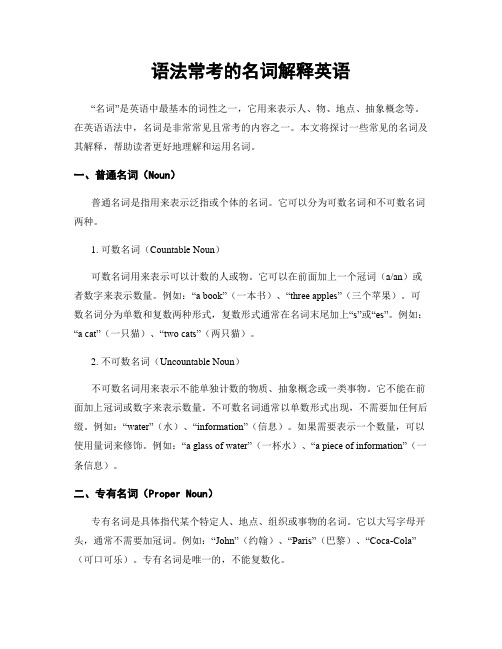
语法常考的名词解释英语“名词”是英语中最基本的词性之一,它用来表示人、物、地点、抽象概念等。
在英语语法中,名词是非常常见且常考的内容之一。
本文将探讨一些常见的名词及其解释,帮助读者更好地理解和运用名词。
一、普通名词(Noun)普通名词是指用来表示泛指或个体的名词。
它可以分为可数名词和不可数名词两种。
1. 可数名词(Countable Noun)可数名词用来表示可以计数的人或物。
它可以在前面加上一个冠词(a/an)或者数字来表示数量。
例如:“a book”(一本书)、“three apples”(三个苹果)。
可数名词分为单数和复数两种形式,复数形式通常在名词末尾加上“s”或“es”。
例如:“a cat”(一只猫)、“two cats”(两只猫)。
2. 不可数名词(Uncountable Noun)不可数名词用来表示不能单独计数的物质、抽象概念或一类事物。
它不能在前面加上冠词或数字来表示数量。
不可数名词通常以单数形式出现,不需要加任何后缀。
例如:“water”(水)、“information”(信息)。
如果需要表示一个数量,可以使用量词来修饰。
例如:“a glass of water”(一杯水)、“a piece of information”(一条信息)。
二、专有名词(Proper Noun)专有名词是具体指代某个特定人、地点、组织或事物的名词。
它以大写字母开头,通常不需要加冠词。
例如:“John”(约翰)、“Paris”(巴黎)、“Coca-Cola”(可口可乐)。
专有名词是唯一的,不能复数化。
三、集体名词(Collective Noun)集体名词是用来表示一组人、事物或概念的名词。
它通常以单数形式出现,但却可以表示多个个体。
例如:“family”(家庭)、“team”(团队)。
当集体名词被看作一个整体时,可以用单数动词来修饰;当集体名词被看作个体时,可以用复数动词来修饰。
例如:“My family is going on vacation.”(我的家人们要去度假。
名词的种类_名词 英语语法.doc
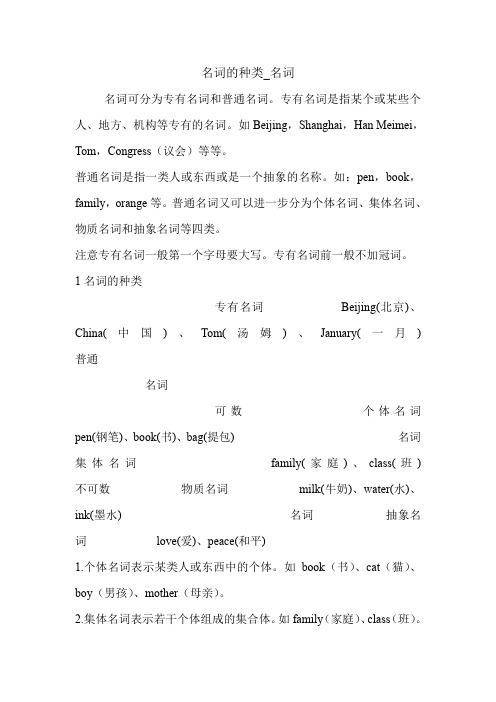
名词的种类_名词名词可分为专有名词和普通名词。
专有名词是指某个或某些个人、地方、机构等专有的名词。
如Beijing,Shanghai,Han Meimei,Tom,Congress(议会)等等。
普通名词是指一类人或东西或是一个抽象的名称。
如:pen,book,family,orange等。
普通名词又可以进一步分为个体名词、集体名词、物质名词和抽象名词等四类。
注意专有名词一般第一个字母要大写。
专有名词前一般不加冠词。
1名词的种类专有名词Beijing(北京)、China(中国)、Tom(汤姆)、January(一月) 普通名词可数个体名词pen(钢笔)、book(书)、bag(提包) 名词集体名词family(家庭)、class(班) 不可数物质名词milk(牛奶)、water(水)、ink(墨水) 名词抽象名词love(爱)、peace(和平)1.个体名词表示某类人或东西中的个体。
如book(书)、cat(猫)、boy(男孩)、mother(母亲)。
2.集体名词表示若干个体组成的集合体。
如family(家庭)、class(班)。
3.物质名词表示无法分为个体的实物。
如water(水)、tea(茶)、milk (牛奶)、coffee(咖啡)等。
4.抽象名词表示动作、状态、品质、感情等抽象的概念。
如love(爱)、beauty(美)等。
注意物质名词与抽象名词一般无法用数目来计算,称为不可数名词。
不可数名词前不能加冠词a或an来表示量。
必背!名词的可数与不可数a.有的普通名词具有两重性,既能做可数名词,又能做不可数名词,但它们在意义上往往有很大的不同。
可数名词 a glass 玻璃杯a paper 报纸a dress 一件女服不可数名词glass 玻璃paper 纸dress (统指)衣服b.有许多名词在汉语里是可数名词,在英语里却不可数。
如:chalk (粉笔)、paper(纸)、bread(面包)、rice(米)、grass(草)、news (新闻)等。
关于名词的英语语法_转自DOCX
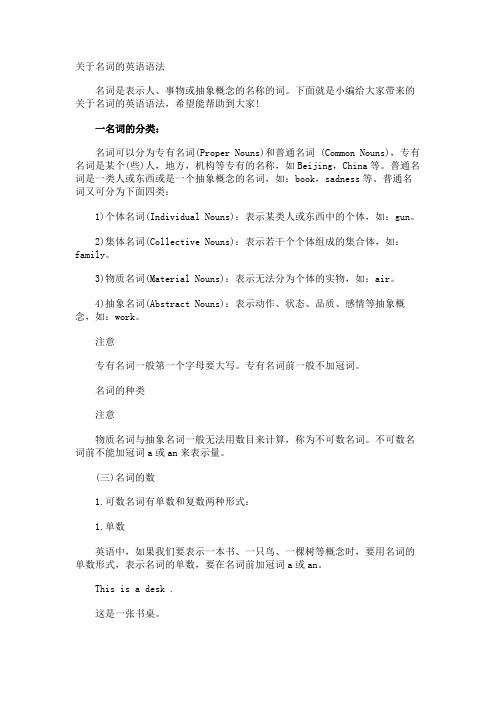
关于名词的英语语法名词是表示人、事物或抽象概念的名称的词。
下面就是小编给大家带来的关于名词的英语语法,希望能帮助到大家!一名词的分类:名词可以分为专有名词(Proper Nouns)和普通名词 (Common Nouns),专有名词是某个(些)人,地方,机构等专有的名称,如Beijing,China等。
普通名词是一类人或东西或是一个抽象概念的名词,如:book,sadness等。
普通名词又可分为下面四类:1)个体名词(Individual Nouns):表示某类人或东西中的个体,如:gun。
2)集体名词(Collective Nouns):表示若干个个体组成的集合体,如:family。
3)物质名词(Material Nouns):表示无法分为个体的实物,如:air。
4)抽象名词(Abstract Nouns):表示动作、状态、品质、感情等抽象概念,如:work。
注意专有名词一般第一个字母要大写。
专有名词前一般不加冠词。
名词的种类注意物质名词与抽象名词一般无法用数目来计算,称为不可数名词。
不可数名词前不能加冠词a或an来表示量。
(三)名词的数1.可数名词有单数和复数两种形式:1.单数英语中,如果我们要表示一本书、一只鸟、一棵树等概念时,要用名词的单数形式,表示名词的单数,要在名词前加冠词a或an。
This is a desk .这是一张书桌。
There is an orange on the table .桌上有一个橘子。
an orange 一个橘子an new orange (×) → a new orange (○)一个新橘子a deska old desk (×) → an old desk (○)一张旧课桌a和an的使用区别a加在以辅音开头的名词前,如a book,a pen。
an加在以元音开头的名词前,如an egg,an apple。
注意有时a,an后面紧接的不是单数名词,而是a (an) +形容词+单数名词的形式。
- 1、下载文档前请自行甄别文档内容的完整性,平台不提供额外的编辑、内容补充、找答案等附加服务。
- 2、"仅部分预览"的文档,不可在线预览部分如存在完整性等问题,可反馈申请退款(可完整预览的文档不适用该条件!)。
- 3、如文档侵犯您的权益,请联系客服反馈,我们会尽快为您处理(人工客服工作时间:9:00-18:30)。
英语中的专有名词_名词
专有名词的定义:
专有名词表示特定的人名、地名或组织机构的名称,专有名词一般具有独一性。
除个别外,专有名词通常没有复数形式。
例如:
1. 人名、地名:Jenny 珍妮Smith 史密斯China 中国Asia 亚洲the Great Wall 长城London 伦敦
2. 组织机构、时间、书籍报刊等的名称:the United Nations 联合国Bank of China 中国银行May 五月份Sunday 星期天Time《时代》周刊the Guardian《卫报》
3. 家庭关系名称、个人头衔:Mum 妈妈Grandpa 爷爷Doctor Black 布莱克大夫Captain Grey 格雷船长Mr. Hopkins 霍普金斯先生Miss White 怀特小姐
专有名词的注意事项:
1. 因为专有名词具有专有独一性,所以一般情况下,专有名词的第一个字母要大写,不能在专有名词的前面加上不定冠词a,也不能在专有名词词尾加上表示复数形式的-s。
如:
Beijing is the capital of China.
北京是中国的首都。
但是有时专有名词可以转化成为普通名词,转化后它就具有普通名词的特性了,即可以在其前面加上不定冠词a,在其词尾加上表示复数形式的-s。
以下是专有名词转化成可数普通名词的例子:
A Mr Green called just now.
刚才有位格林先生打来电话。
(此时a Mr Green = a man called Mr Green)
I knew a John Lennon, but not the famous one.
我认识一个叫约翰莱农的人,但不是著名的那一位。
英语中的专有名词
There are three Johns in this class.
这个班里有三个叫约翰的人。
(此时three Johns = three persons called John)
There are many Edisons in our country.
此句有两种不同的意思:
其一、我们国家有许多叫爱迪生的人。
其二、我们国家有许多像爱迪生一样的发明家。
2. 姓氏是专有名词,一般没有复数形式,而且也不能加定冠词the。
但是,当姓氏的前面加定冠词the,在后面加上-s,表示一家人。
如:the Smiths 史密斯一家人
The Blacks have moved house. 布莱克一家已经搬走了。
3. 有些专有名词表面上看是复数形式,但是在实际使用中谓语动词通常采用单数形式。
例如:
the United States 美国
The United Nations was organized in 1945. 联合国是1945年组建起来的。
这里把the United Nations看成一个整体。
